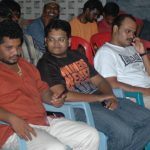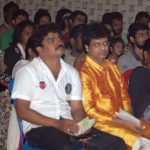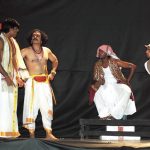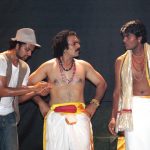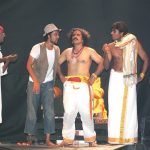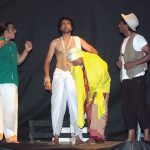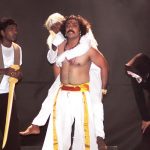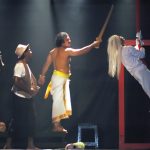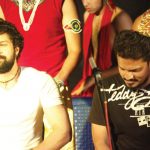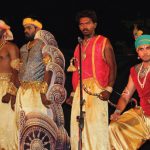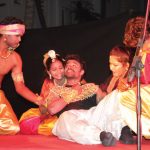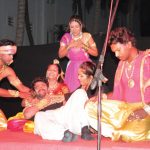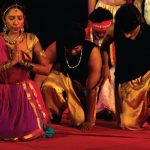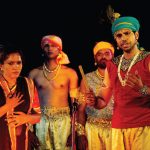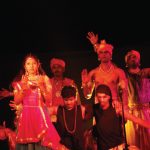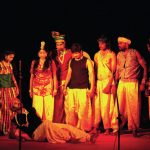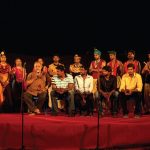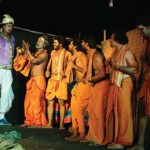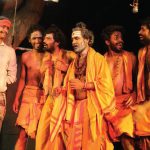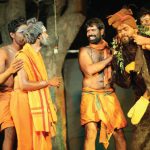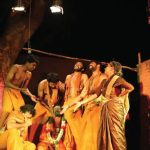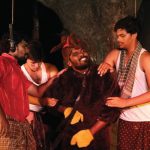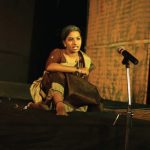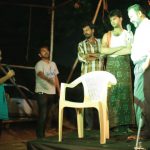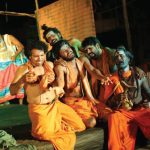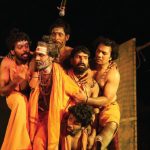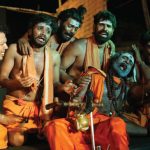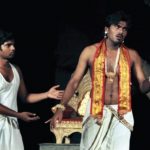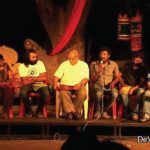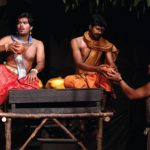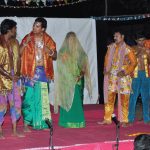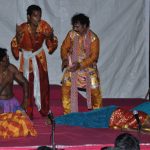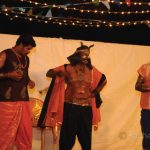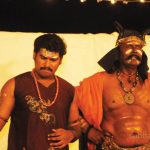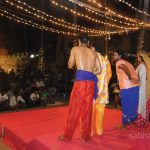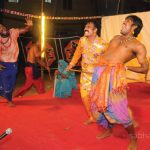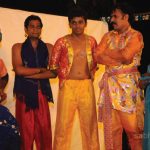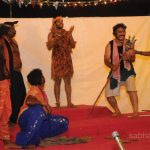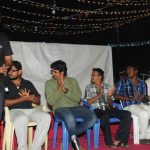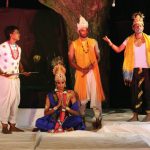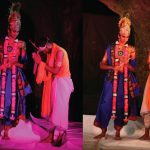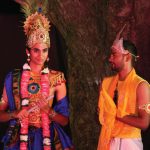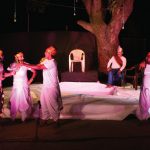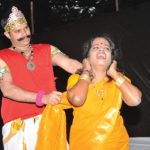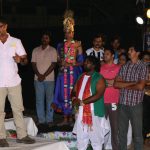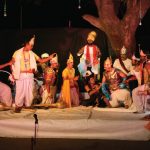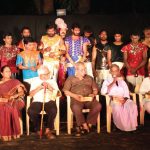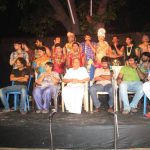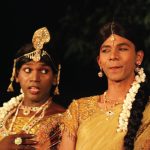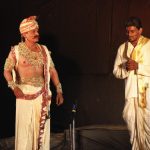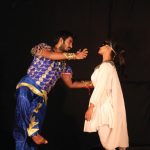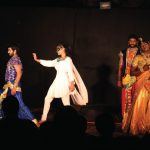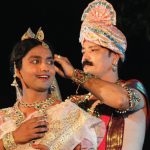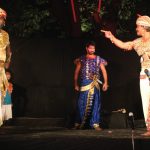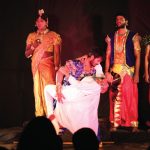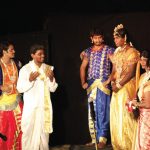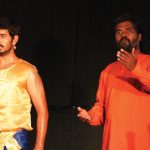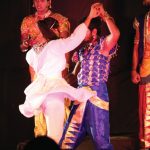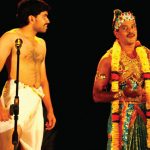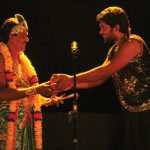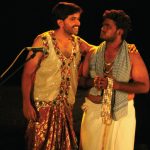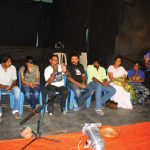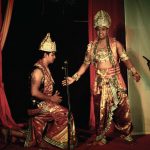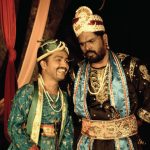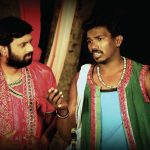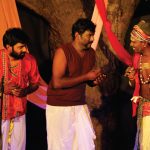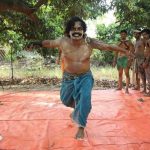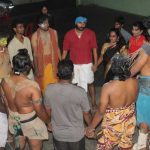The stories about Vikramaathithan are very popular in our house hold and has become bed-times stories. Anandha-K-Koothu Trust has adapted this story as a means to train budding actors. The presentation is in the Theru-k-Koothu (Tamil folk theatre) format. The play is introduced by Kattiyakkaran (Narrator) and starts with the invocation to Lord Ganesha.
There are about 18 scenes (Episodes) dealing with the exploits of Vikramathithya involving characters like Viswamithra, Indira, Rambai, Oorvasi, Patti (brother of Vikramaathithya) Goddes Kaali, Lord Ganesha, Vedhalam etc.
Name of the play : THEROTTI MAGAN (Son of a charioteer)
Author of the play : P.S.RAMAIYA
Directed by : G.SREEDEVI
Karna is one of the central characters in the Hindu epic Mahabharata from ancient India. He was the King of Anga. Karna was one of the greatest warriors whose martial exploits are recorded in the Mahābhārata, an admiration expressed by Krishna and Bhishma within the body of this work.
Karna was the son of Surya (a solar deity) and Kunti. He was born to Kunti before her marriage with Pandu. Karna was the closest friend of Duryodhana and fought on his behalf against the Pandavas (his brothers) in the famous Kurukshetra war. Karna fought against misfortune throughout his life and kept his word under all circumstances. Many admire him for his courage and generosity.
Name of the play : PARAMAARTHA GURU
Author of the play : VEERAMAMUNIVAR (alias) FATHER
CONSTANTIUS JOSEPH BESCHI
Directed by : G.SREEDEVI
Paramaartha Guru and his 5 disciples are crossing a river. The guru tells his disciples that the river should not be crossed when it is awake and should be done so only when it is a sleep. So saying the guru asks the disciple Milecha to check if the river is awake. Milecha picks up a piece of burning fire wood and dips it into the river. The river hisses. Realizing that the river is awake and thus not the right time to cross the river, they decide to rest for a while. After a while the guru sends Madayan another disciple to go and check if the river has fallen asleep. Madayan picks up the same piece of extinguished fire wood and dips it into the river. The river remains silent. Sensing that it is the right time, they cross the river. On reaching the other bank, they count themselves to check if all of them had crossed the river safely. Each person when counting leaves himself out and thus is shocked to see that only five of them are there. Thinking that the river has eaten one amongst them they start crying.
A man on a horse crossing the river stops and enquires them of their grief. They tell him that the river has eaten one of them and that they were only five of them left. The horse man realizing their stupidity tells them that he has a magic whip which could bring back the sixth person to life. The guru and his disciples say that if he does so they would gladly give him all the money that they have. He tells them that he would whip each one of them and at that moment that person would have to shout his name aloud and he would thus bring back the sixth person. The guru and his disciples oblige, get whipped and realize that all six of them are their. They are very happy. The disciples feel that if they also had a horse they could have crossed the river without any fear, and so decide to buy horse for their guru. How the guru and his disciples buy a horse and what happens after a ward is what this play is about.
The great epic Mahabharatha has contributed immensely to Indian culture. Tamil Nadu is home to Theru-k-koothu, a form of street theatre with primordial folk origins.
The current production – Kisaga Vadham is a standing testimony to both these gifts of Indian heritage. This piece is based on the Koothu play of the same name and serves as a living modern signpost of an ancient art and of an even more ancient epic.
After the loss in the game of dice, the Pandavas undergo a series of trials and tribulations. Post the Vanavaas – the exile in the jungle, the Pandavas are to live incognito accompanied by the Sage Thowmiyar in the ‘Agnaathavaasa’ phase. They take refuge in the kingdom of Viraadanagar in various guises. Yudhishtira becomes a counselor, Bhima a cook, Arjuna a eunuch dance-master, Nakula a horse-keeper, and Sahadeva becomes a cowherd while Drupadi finds herself as a daasi to the Queen.
The circumstances find the Pandavas rehearsing along with Draupadi in the nights post their daily routines. The Sage Thowmiyar, a master narrator and a trickster par excellence guides them while he poses as the leader of a performing troupe. Meanwhile, Kisaga, the brother of the queen of Viraadanagar begins to lust for Draupadi. An embarrassed Draupadi seeks refuge in the mighty Bheema who proves to be the nemesis of the wily Kisaga, ending the misery for Draupadi and killing him.
Name of the play : CHANDRAHARI
Author of the play : PAMMAL SAMBANDA MUDALIYAR
Directed by : G. ANANDHA KANNAN
Pammal Sambandha Mudaliar, “the founding father of modern Tamil theatre” was a playwright, director, producer and actor of the late nineteenth- and early twentieth centuries. Anandha-K-Koothu Trust takes great pride in performing Mudaliar’s burlesque play Chandrahari written in 1923.
About the director: G.Anandha Kannan a theatre specialist and a pioneer member of theatre group in Singapore, has been actively involved in theatre for more than 15 years. He has acted, directed, lighting directed and written plays of various genres in Singapore, Malaysia, India and Australia.
Name of the play : PANJALI
Author of the play : A.SULTHAN & G.SREEDEVI
Directed by : G.SREEDEVI
Panjali was a workshop script based on the characters of Mahabharatham. The script was traveling in parallel time line from the point of Panjali’s laughter at Druyothanan. The Panjali’s laughter was made to be the pivotal point to discuss the before and after if the great epic.
Name of the play : SEEVAKA SINTHAMANI
Author of the play : J.APPANDAIRAJAN
Directed by : G.SREEDEVI
Seevakan was a hero born amidst chaos and irony in a graveyard, the last place where birth could take place. His father, a king, smitten by the beauty of his mother gave the duties of the state to his minister, who later killed the king to take over the kingdom. Seevakan was born to a fallen king and a queen. Yet, the community did not recognize his birth and higher stature. The epic is about how the talented Seevakan, after going through numerous conquests and challenges manages to reclaim his father’s kingdom and finally renounces everything to get liberated.
The epic comes from a monk, who has supposedly renounced the gratification that comes from physical pleasures. This very third person and transcendental perspective has enabled the author to give a treatise, which is aesthetically and linguistically brilliant.
The epic deals with characters, who have issues that are very universal. Seevagan fits perfectly to Aristotle’s descriptions of a tragic hero. Aristotle envisions a tragic hero whose birth happens in a very chaotic circumstance. The hero is denied his rightful stature in the community and he goes on a journey in search of a solution. Any incident or achievement, however great it maybe does not satisfy the purpose of the character’s existence. The final conflict that reveals the true identity of the hero puts him back into the community. The fact that an epic that is written in 9th Century AD deals with all these issues accurately is very interesting.
Seevaka Sinthamani has not yet been treated as extensively as Silappathigaaram or Manimegalai, in spite of it having such universal elements of theatre and drama. It also contains elements of magic and sorcery that are similar to Shakespearean plays.
Name of the play : ALLI SARITHIRAM (Alli’s story)
Author of the play : T.T. SANKARADAS SWAMIGAL
Directed by : G.SREEDEVI
Arjuna and his guru Krishna arrive at Madurai for pilgrimage and soon Arjuna learns from a Chettiar of a very beautiful, brave and man hating queen of Madurai called Alli. Curious, Arjuna with the help of Krishna sees Alli from a distance and falls in love with her. Arjuna then asks Krishna’s help to get him married to Alli. Krishna who refuses at first to help but later decides to set a series of challenges for Arjuna. The challenges involved magic, lust and danger. All these engulfs Arjuna throughout his tumultuous adventure in getting Alli’s hand for marriage. He succeeds in some and fails in some others. What is the final outcome for Alli and Arjuna? Will they become man and wife? Or will Alli’s man hating mentality get the better of her? Watch this in the show.
About the play – Urvasiyen Sabam
The armies of Thuruyothanan and Arjunan are getting ready for battle and Arjunan is doing severe penance to attain the ‘Paasupathaasthiram’ from Lord Shiva. Lord Shiva and Devendra want to test him, so, they depute Manmathan, Oorvasi and Ramba to disturb Arjunan but they collectively fail. While Oorvasi falls in love with the handsome Arjuna. It is Sahuniraajan from Thuruyothanan’s camp who assigns Viyakrakupthan and Simmakupthan to find Arjunan’s place of penance and sends Mohaasuran in the guise of a pig to kill Arjunan but instead Arjunan kills him. By then Lord Shiva transforms himself to a hunter and fights with Arjunan, finally acknowledging his strength and granting him the ‘Paasupathaasthiram’. Devendran then invites Arjunan to ‘Devalokam’ and gifts him a ‘Kreedom’ and requests him to hand over his ring to Oorvasi. Infatuated by Arjunan, Oorvasi tries to entice him with her charm, finally on failing, she curses him. Arjunan is now, afraid that he may lose his valour to fight Thuruyothanan. Finally Devendran intervenes and Oorvasi retraces her curse. Devendran reveals the ‘Devarahasiyam’ about Oorvashi’s curse and explains how it will do only good. The climax is all about how things always happen for the good.
About the playwright :
Pammal Sambandha Mudaliar, “the founding father of modern Tamil theatre” was a playwright, director, producer and actor of the late nineteenth- and early twentieth centuries. Anandha-K-Koothu Trust takes great pride in performing Mudaliar’s burlesque play Urvasiyen Sabam written in 1923.
About the play:
Enraged by the death is his uncle Khumbakarana, Indrajith, the son of Raavana, begins to battle in the epic Raavana war in order to destroy and kill the Ayodhya brothers, Rama and Lakshmana. Lakshmana rakes perfect aim and fires his sharp arrow, destroying Indrajith’s chariot and armour. Terrified by the power of Lakshmana, Indrajith flees back to Lanka, where he plans to perform a yaga to attain invincibility Meanwhile, Raavana sends his loyal council member Mahodaran to war in order to keep Lakshmana occupied. Indrajith on the other hand, sees and opportunity to manipulate and take things by his own stride. He shoots Lakshmana with the Brahmastra. Rama and his troops are stunned and are in shock by the insensitive act of Indrajith. Raavana orders Thrisadai to show the poor and helpless Sita, the state of things on the battlefield, moreover the state of her husband Rama and brother in law Lakshmana. Sita gets rather emotional and begins to weep uncontrollably on seeing her husband.
Lord Hanuman to bring the herb Sanjeevi to cure and relive Lakshmana of his pain. Lord Hanuman searches far and wild and is finally successful in his mission and saves Lakshmana. Indrajith’s greed to grow stronger and all powerful was never ending and so he created an illusion of Sita being slit in front of Hanuman, in order to finish his yaga while the vanaras were upset and filled with remorse. Vibhishana, doubts the acts of Indrajith and confirms that Sita is alive and well, he learns about Indrajith’syaga that is being performed in Nigumalai and warns Lakshmana and Hanuman. The mighty trio, Lakshmana, Hanuman and Vibhishana set out to destroy his yaga, hence making Indrajith grow week in his powers. Indrajith manages to escape with his life, he quickly runs to Raavana and pleads to release Sita. The mighty Raavana clearly denies and refuses, forcing his son to enter battle once again. Lakshmana sure not to miss, slays Indrajith’s head and takes it to Lord Rama as a sign of Victory. Raavana furious by the death of his son, let’s out a cry of anguish on the battle field. Raavana decides to avenge the death of his son, and bring back his head.
